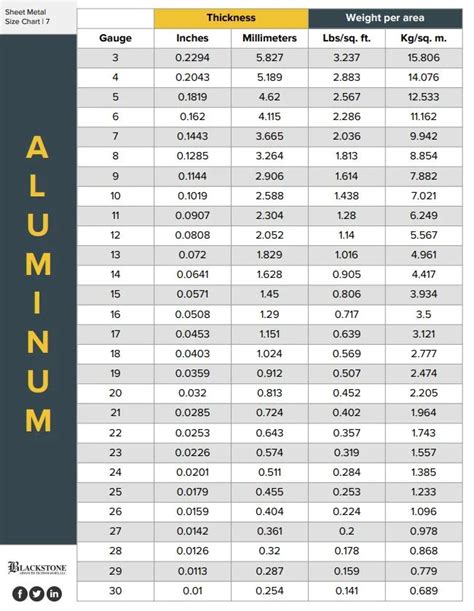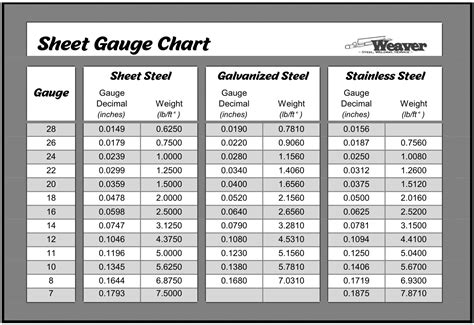18 gauge aluminum sheet metal thickness Pure metal / Used as an alloy element for aluminum, lead, zinc, and other . In steel between 0.5 and 0.8 in. thick, grade 350 and 400 may have a minimum bend radius of 2.5 times the material thickness when transverse bending, while longitudinal bending may require a minimum bend radius that’s 3.75 times the material thickness (see Figure 1).
0 · standard aluminum plate thickness chart
1 · how thick is 18ga steel
2 · how thick is 18ga aluminum
3 · convert 18 gauge to inches
4 · aluminum thickness gauge chart
5 · aluminum sheet thickness chart
6 · aluminum sheet gauge chart
7 · alum thickness to gauge chart
Junction boxes protect the electrical connections from the weather, as well as protecting people from accidental electric shocks. A small metal or plastic junction box may form part of an electrical conduit or thermoplastic-sheathed cable (TPS) wiring system in a building.
The chart below can be used to determine the equivalent sheet thickness, in inches or millimeters, for a gauge number from the selected gauge size standard. The weight per unit area of the sheet can also be seen in pounds per square foot and kilograms per square meter.
Pure metal / Used as an alloy element for aluminum, lead, zinc, and other . Ga. is different from inches, there is no conversion formula. Even when the non .GAUGE TO THICKNESS CHART Gauge Stainless Galvanized Sheet Steel Aluminum Fraction inches (mm) inches (mm) inches (mm) inches (mm) 30 0.0125 (0.33) 0.0157 (0.40) 0.0120 . For example, in one gauge system, 18 gauge steel measures 0.0478 inches thick, but 18 gauge aluminum is 0.0403 inches thick. Because of the varying thicknesses, a gauge chart should be used to ensure the metal .
Below you will find a chart for metal thicknesses and weights. Commonly used metals for manufacturing at our shop are: Aluminum: 0.025", 0.032", 0.040", 0.050", 0.063", 0.080", 1/8" .
standard aluminum plate thickness chart
how thick is 18ga steel
These are American (Brown & Sharpe) Gauges.Find the proper measurement for your gauge size. This chart compares gage numbers to their steel and aluminum sizing standards.,829.00,029.00
9.00For example, 18 gauge steel, according to a gauge conversion chart, is 0.0478 inch or 1.214. Use our handy chart to convert standard gauge numbers in decimals of an inch for sheet steel, .According to a gauge conversion chart, 18 gauge steel is 0.0478 inches or 1.214 millimeters thick. It doesn’t matter how big the gauge number is. The gauge indicates the standard thickness of the sheet metal for a specific material. As .

The chart below can be used to determine the equivalent sheet thickness, in inches or millimeters, for a gauge number from the selected gauge size standard. The weight per unit area of the sheet can also be seen in pounds per square foot and kilograms per square meter.Ga. is different from inches, there is no conversion formula. Even when the non-ferrous metal plate and the steel plate are the same Ga., the thickness is actually different. You can find the gauge to mm / inch conversion for sheet metal by the chart below.
how thick is 18ga aluminum
GAUGE TO THICKNESS CHART Gauge Stainless Galvanized Sheet Steel Aluminum Fraction inches (mm) inches (mm) inches (mm) inches (mm) 30 0.0125 (0.33) 0.0157 (0.40) 0.0120 (0.30) 0.0100 (0.25) . 18 0.0500 (1.27) 0.0516 (1.31) 0.0478 (1.21) 0.0403 (1.02) For example, 18-gauge sheet metal would be 0.040 inches thick if made from aluminum and 0.048 inches thick if made from stainless steel. That’s why it is important to ensure you use the right conversion chart for the given piece of sheet metal.
For example, in one gauge system, 18 gauge steel measures 0.0478 inches thick, but 18 gauge aluminum is 0.0403 inches thick. Because of the varying thicknesses, a gauge chart should be used to ensure the metal meets the required dimensions.Below you will find a chart for metal thicknesses and weights. Commonly used metals for manufacturing at our shop are: Aluminum: 0.025", 0.032", 0.040", 0.050", 0.063", 0.080", 1/8" (0.125") and 1/4" (0.25"). Cold and hot rolled steel: 16 gauge, 14 gauge, 1/8" and 1/4". Galvanized steel: 24 gauge, 20 gauge, 18 gauge and 16 gauge.These are American (Brown & Sharpe) Gauges.Find the proper measurement for your gauge size. This chart compares gage numbers to their steel and aluminum sizing standards.
cnc mountain bike parts
For example, 18 gauge steel, according to a gauge conversion chart, is 0.0478 inch or 1.214. Use our handy chart to convert standard gauge numbers in decimals of an inch for sheet steel, aluminum and stainless. Click here for a Gauge to mm Conversion Chart.According to a gauge conversion chart, 18 gauge steel is 0.0478 inches or 1.214 millimeters thick. It doesn’t matter how big the gauge number is. The gauge indicates the standard thickness of the sheet metal for a specific material. As the gauge number .The chart below can be used to determine the equivalent sheet thickness, in inches or millimeters, for a gauge number from the selected gauge size standard. The weight per unit area of the sheet can also be seen in pounds per square foot and kilograms per square meter.Ga. is different from inches, there is no conversion formula. Even when the non-ferrous metal plate and the steel plate are the same Ga., the thickness is actually different. You can find the gauge to mm / inch conversion for sheet metal by the chart below.
GAUGE TO THICKNESS CHART Gauge Stainless Galvanized Sheet Steel Aluminum Fraction inches (mm) inches (mm) inches (mm) inches (mm) 30 0.0125 (0.33) 0.0157 (0.40) 0.0120 (0.30) 0.0100 (0.25) . 18 0.0500 (1.27) 0.0516 (1.31) 0.0478 (1.21) 0.0403 (1.02) For example, 18-gauge sheet metal would be 0.040 inches thick if made from aluminum and 0.048 inches thick if made from stainless steel. That’s why it is important to ensure you use the right conversion chart for the given piece of sheet metal. For example, in one gauge system, 18 gauge steel measures 0.0478 inches thick, but 18 gauge aluminum is 0.0403 inches thick. Because of the varying thicknesses, a gauge chart should be used to ensure the metal meets the required dimensions.
Below you will find a chart for metal thicknesses and weights. Commonly used metals for manufacturing at our shop are: Aluminum: 0.025", 0.032", 0.040", 0.050", 0.063", 0.080", 1/8" (0.125") and 1/4" (0.25"). Cold and hot rolled steel: 16 gauge, 14 gauge, 1/8" and 1/4". Galvanized steel: 24 gauge, 20 gauge, 18 gauge and 16 gauge.These are American (Brown & Sharpe) Gauges.
Find the proper measurement for your gauge size. This chart compares gage numbers to their steel and aluminum sizing standards.For example, 18 gauge steel, according to a gauge conversion chart, is 0.0478 inch or 1.214. Use our handy chart to convert standard gauge numbers in decimals of an inch for sheet steel, aluminum and stainless. Click here for a Gauge to mm Conversion Chart.

convert 18 gauge to inches
Metallic fibre, in textiles, synthetic fibre, known generically as metallic, including manufactured fibres composed of metal, metal-coated plastic, or of a core covered by metal (usually aluminum). Trademarked names include Chromeflex, Lurex, and Melora.
18 gauge aluminum sheet metal thickness|standard aluminum plate thickness chart